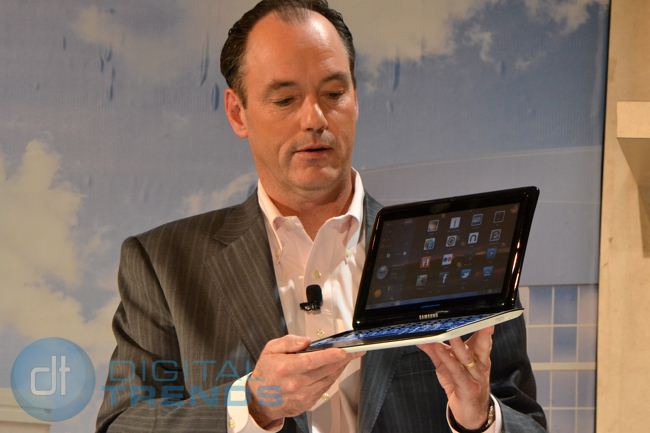
Third year’s the charm. Samsung first pried its way into the crowded notebook computer space two years ago, and despite establishing a solid foothold with vanilla netbooks, the company looks to be spreading its creative wings for the third year in the States. On Wednesday, the consumer electronics giant showcased an ultralight, aerospace-inspired notebook, as well as a hybrid tablet that slides open to reveal a full-sized keyboard.
A wing and a prayer
At 2.88 pounds and 0.68 inches thick, Samsung’s Note PC 9 Series could easily be mistaken for a netbook on numbers alone, but the next-gen Intel Core i5 or Core i7 under the hood would beg to differ. Samsung realized the weight savings using Duralum, a lightweight alloy used in aerospace, and gave the machine swoopy, wing-like curves to match. And this is no prop plane: Samsung claims the 9 Series will boot to the desktop in just 12 seconds thanks to an SSD and wake from sleep in three seconds, which rivals even Apple’s rocketship MacBook Air.

That turns out to be an apt comparison, considering the Series 9 packs a 13-inch screen. Samsung opted for a Super Bright Plus model, which offers 400 nits of brightness, a 1,300 to one contrast ratio, and 16 million colors, and 1366 x 768 resolution.
Supersized slider
Cashing in on the tablet trend that has stricken just about every manufacturer this year, Samsung also contorted one of its latest notebooks into a tablet – but not the way you would expect. Unlike your garden-variety convertible tablet with a pivoting screen, the Note PC Series 7 actually has a screen that slides linearly away from the keyboard beneath like a giant smartphone, then pivots up like an ordinary laptop hinge. Specs are more netbookish, including a 10.1-inch screen, 1.66GHz Intel Oak Trail processor, 2GB of RAM and a missing optical drive, but it runs Windows 7 and should be priced at only $699 when it arrives in March. Samsung will offer both 32GB and 64GB variants, both using SSDs that should allow them to boot in around 20 seconds.



